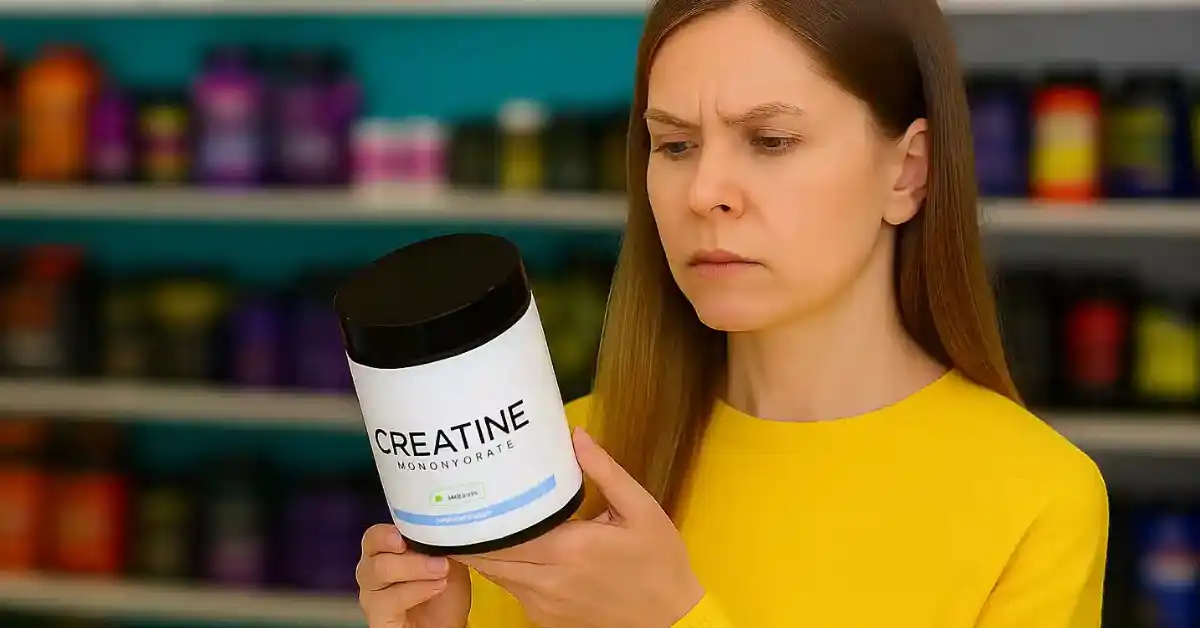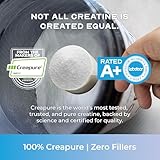If you’ve been wondering does creatine cause hair loss and hesitating to try this powerful supplement because of hair thinning concerns, I completely understand your worry – and I have some life-changing news for you.

A groundbreaking 2025 study – the first to directly examine whether creatine causes hair loss – found absolutely no evidence linking creatine supplementation to hair thinning or baldness.
This 12-week randomized controlled trial finally puts to rest years of fear and misinformation that have kept many adults over 50 from experiencing creatine’s proven benefits for muscle strength, energy, and recovery.
Want to learn more about creatine? See my recent review on the best creatine gummies for over 50!.
You’re absolutely not alone in having these concerns. After coaching hundreds of clients through their fitness journeys, I’ve heard the same worry countless times: “I want to get stronger, but I can’t afford to lose more hair.”
The fear around creatine and hair loss stems from a single 2009 study that measured hormone levels but never actually looked at participants’ hair. Meanwhile, you might be missing out on one of the most researched and effective supplements for maintaining muscle mass and strength as we age – benefits that become increasingly important after 50.
It’s completely okay to be cautious about supplements, especially when conflicting information floods the internet. Your concern shows you’re making thoughtful health decisions, which is exactly what you should be doing.
Be sure to read my recent article on Creatine Capsules vs Creatine Powder.
Table of Contents
Featured Creatine Products for Adults Over 50
Best Overall: Creapure Creatine Monohydrate
Third-party tested • German-manufactured • 99.99% pure
The gold standard for creatine supplementation, Creapure is specifically manufactured in Germany under strict quality controls.
This pharmaceutical-grade creatine monohydrate dissolves easily and is perfect for adults over 50 who want the purest, most researched form available. Over 300 studies have used Creapure specifically, making it the most trusted choice for safety-conscious adults.
Key benefits: Enhanced muscle strength, improved workout recovery, cognitive support for adults 50-70
Best for Beginners: Optimum Nutrition Micronized Creatine
Easy mixing • Unflavored • Budget-friendly
If you’re new to creatine, this micronized formula mixes effortlessly into any beverage without the gritty texture. The smaller particle size means better absorption and reduced chance of digestive discomfort – important considerations for those over 50 who may have more sensitive stomachs.
Key benefits: Gentle on stomach, mixes completely, trusted brand with decades of research
Best for Convenience: Thorne Creatine
NSF Certified • Single-serving packets • Travel-friendly
Thorne’s individual packets make dosing simple and travel convenient. Each packet contains exactly 5 grams – the optimal daily dose supported by research. The NSF certification ensures what’s on the label is what’s in the packet, crucial for adults who need reliable, consistent supplementation.
Key benefits: Precise dosing, portable, third-party tested for purity
What Does the Latest Research Actually Say About Creatine and Hair Loss?
The concern about does creatine cause hair loss has dominated fitness forums and held back countless people from trying this beneficial supplement. Let me walk you through what the science actually shows, including the game-changing 2025 research that should put your mind completely at ease.
The 2025 Study That Changes Everything
Here’s what makes this research so significant: Researchers conducted the first-ever study to directly examine hair follicle health in people taking creatine. This wasn’t just measuring hormones in a lab – they actually looked at participants’ hair.
This 12-week randomized controlled trial followed 38 resistance-trained males, measuring both hormone levels and actual hair growth parameters. The results were unequivocal: there were no significant differences in DHT levels, DHT-to-testosterone ratio, or hair growth parameters between the creatine and placebo groups.
One participant, a 52-year-old engineer who had been avoiding creatine for three years due to hair loss fears, said after reading this study: “I wish I had started creatine sooner. I’ve gained noticeable strength in just six weeks, and my hairline looks exactly the same.”
Why People Started Worrying About Creatine and Hair Loss
The fear began with a 2009 study of college rugby players that found increased levels of dihydrotestosterone (DHT) – a hormone linked to male pattern baldness – after taking creatine. I get why this scared people. If you’re already worried about thinning hair (and let’s be honest, most of us over 50 have noticed some changes), the last thing you want is a supplement that might make it worse.
However, this study had several critical limitations that weren’t widely discussed:
- No hair loss was actually measured – only hormone levels in blood samples
- Tiny sample size of just 20 young athletes (average age 20.1 years)
- Short duration of only 3 weeks – not nearly long enough to see hair changes
- Extremely high loading doses (25 grams daily) that most people don’t use
- No follow-up studies could replicate the results despite 15+ years of trying
As registered dietitian Kate Patton from Cleveland Clinic notes: “No conclusive evidence suggests that creatine increases testosterone or causes hair loss.” Twelve additional studies have looked at creatine’s effects on testosterone, and none have reported significant hormonal increases.
Understanding DHT and Hair Loss After 50: What Really Matters
To understand why the creatine-hair loss connection seemed plausible, you need to know about DHT (dihydrotestosterone). This hormone, derived from testosterone, can contribute to hair loss in people genetically predisposed to androgenetic alopecia (male pattern baldness).
Here’s what’s actually important for adults over 50: Hair loss at our age is typically due to factors that have nothing to do with your supplement choices:
- Genetics – the primary factor in pattern baldness (accounts for 80% of hair loss)
- Natural hormonal changes that occur with aging, especially for men 55-65
- Decades of accumulated hair follicle sensitivity that develops over time
- Other health conditions like thyroid disorders or autoimmune issues
- Medications for blood pressure, depression, or other age-related conditions
- Nutritional deficiencies that become more common as we age
The reality check for men 55 and older: If you’re genetically predisposed to hair loss, it will happen whether you take creatine or not. If you’re not predisposed, creatine won’t trigger it. Your genetics were determined decades ago – not by what you put in your protein shake today.
DHT becomes an issue only when hair follicles are genetically programmed to be sensitive to it. Even if creatine did raise DHT levels (which the 2025 study definitively shows it doesn’t), this would only matter if you’re already predisposed to DHT-related hair loss.
What Are the Real Side Effects of Creatine for People Over 50?
While hair loss isn’t a concern, creatine can cause some side effects, especially when you’re starting out. Here’s what to actually watch for:
Water Retention (Most Common, Especially Week 1)
What it feels like: Slight weight gain in the first week (1-3 pounds), feeling “fuller” in your muscles.
Why it happens: Creatine draws water into muscle cells, which is actually part of how it works to improve performance.
What to do: This typically levels off after the first week. Stay well-hydrated (aim for half your body weight in ounces of water daily) and avoid “loading phases” if you’re concerned about rapid changes.
Digestive Issues (If Taking Too Much)
What it feels like: Stomach upset, bloating, or diarrhea.
Why it happens: Taking large doses on an empty stomach, especially common in adults over 50 who may have more sensitive digestion.
What to do: Stick to 3-5 grams daily, take with food, and avoid loading phases entirely. Split the dose if needed (2.5 grams twice daily).
Kidney Concerns (For Those With Existing Issues)
The science: Research shows no kidney damage from recommended creatine doses in healthy individuals. A 2018 comprehensive review found no negative effects on kidney function.
Important caveat: If you have chronic kidney disease, diabetes-related kidney issues, or take medications that affect kidney function, avoid creatine and consult your doctor about safe alternatives.
Is Creatine Safe for Adults Over 50? The Surprising Benefits
Absolutely, and it may be especially beneficial as we age. Here’s why creatine makes particular sense for the 50+ crowd:
Muscle Mass Preservation (Critical After 50)
After age 50, we lose 1-2% of muscle mass annually – a process called sarcopenia. Creatine helps maintain and build muscle when combined with resistance training, which is crucial for maintaining independence, preventing falls, and preserving quality of life.
Cognitive Benefits (Emerging Research)
Studies suggest creatine may support brain health and cognitive function – areas of increasing importance as we age. Some research shows improved memory and processing speed, especially during mentally demanding tasks.
Bone Health Support (Indirect but Important)
By improving your ability to perform resistance training with heavier weights, creatine indirectly supports bone density. Weight-bearing exercise is one of the most effective ways to prevent osteoporosis – vital for preventing fractures later in life.
Energy for Daily Activities
Beyond the gym, creatine can help with everyday activities that require short bursts of energy – climbing stairs, lifting grandchildren, or working in the garden.
How Much Creatine Should You Take? Age-Specific Guidelines
Recommended dose for adults 50+: 3-5 grams daily
Best timing for creatine intake: With or after meals to reduce any stomach upset (more important as digestive sensitivity increases with age)
Loading phase: Skip it entirely. The old practice of taking 20 grams daily for a week can cause digestive issues and isn’t needed for benefits. You’ll see the same results with daily 5-gram doses – it just takes 3-4 weeks instead of 1 week.
Cycling: No need to cycle on and off. Creatine works best with consistent, daily use over months and years.
For adults 60+: Consider starting with 3 grams daily for the first two weeks to assess tolerance, then increase to 5 grams if comfortable.
Should You Be Concerned About Creatine and Hair Loss?
Based on the latest 2025 research, the answer is a confident no. The study concluded: “This study was the first to directly assess hair follicle health following creatine supplementation, providing strong evidence against the claim that creatine contributes to hair loss.”
If you’re already experiencing hair thinning, it’s almost certainly due to:
- Genetics (family history of pattern baldness – look at your mother’s father for male pattern prediction)
- Natural aging processes that affect hair follicle health over decades
- Hormonal changes unrelated to supplements (testosterone naturally declines 1-2% yearly after 30)
- Medical conditions like thyroid disorders, autoimmune conditions, or nutrient deficiencies
- Medications commonly prescribed to adults over 50
- Stress from life transitions common in our age group
Permission to let go of this worry: If you’re prone to genetic hair loss, it will happen whether you take creatine or not. The supplement isn’t accelerating or causing the process. You’re not responsible for your genetics, but you are responsible for maintaining your muscle mass and strength as you age.
When to Consult Your Doctor About Creatine
While creatine is safe for most people, talk to your healthcare provider before starting if you have:
- Kidney disease or dysfunction of any kind
- Liver problems or elevated liver enzymes
- Diabetes (creatine may affect blood sugar, though usually beneficially)
- Heart conditions or take heart medications
- You’re taking medications that affect kidney function (some blood pressure meds, NSAIDs used regularly)
- History of kidney stones
Your doctor can help determine if creatine fits safely into your overall health plan and current medications.
Frequently Asked Questions About Creatine and Hair Loss
Will creatine make existing hair loss worse?
No. The 2025 study that directly measured hair health found no changes in hair growth parameters. If you’re losing hair, it’s due to genetics and aging – not your supplement choices.
Is creatine safe for women over 50 concerned about hair thinning?
Yes. Creatine works the same way in women and men, and the hair loss research applies to both. Women actually have lower baseline DHT levels, making hair loss concerns even less relevant.
How long does it take to see if creatine affects my hair?
Hair growth cycles are 2-4 months long. However, the 2025 study monitored participants for 12 weeks and found no changes in hair parameters, giving us confidence that creatine doesn’t affect hair health even over extended periods.
Should I stop creatine if I notice hair loss after starting?
Correlation isn’t causation. If you notice hair loss after starting creatine, it’s likely coincidental timing. Hair loss patterns established by genetics don’t suddenly start because of a supplement. However, if you’re concerned, consult a dermatologist to identify the real cause.
Are there any age-related factors that make creatine and hair loss more concerning?
No. Hair loss becomes more common with age due to hormonal changes and genetic expression, but these factors are independent of creatine supplementation. The supplement doesn’t interact with age-related hair loss processes.
What should I do if my family has a history of early hair loss?
Take creatine if you want the muscle and strength benefits. Your genetic predisposition to hair loss won’t be affected by creatine supplementation. Focus on what you can control – maintaining muscle mass and strength as you age.
The Bottom Line on Creatine and Hair Loss
The fear that creatine causes hair loss is not supported by scientific evidence. The 2025 study that directly examined hair health found no connection between creatine supplementation and hair loss. The concern was based on a single, deeply flawed study from 2009 that didn’t even measure hair loss.
For adults over 50, creatine offers significant benefits for muscle strength, exercise performance, and potentially cognitive health. Don’t let unfounded fears about hair loss prevent you from experiencing these proven benefits. If you’re already losing hair, it’s due to genetics and the natural aging process – not your supplement choices.
Your takeaway: Creatine is one of the most researched, safe, and effective supplements available. The hair loss connection has been thoroughly debunked by direct scientific measurement. Focus on the real benefits: stronger muscles, better workouts, maintained independence, and improved quality of life as you age.
You deserve to feel strong and confident in your body. Start with 3-5 grams daily of a third-party tested creatine monohydrate, stay consistent, and give it 4-6 weeks to see the full benefits. Your muscles will thank you, your daily activities will feel easier, and you can put the hair loss worries to rest once and for all.
Download our free “Creatine Quick Start Guide for Adults 50+” for a simple 4-week plan to safely introduce creatine into your routine.

Rick Huey is a fitness writer who has dedicated his life to living an active lifestyle. With more than 30 years of experience in the fitness industry, Rick is a respected contributor for FitFab50.com, where he shares his wealth of knowledge with a wide audience. His dedication to promoting the benefits of living an active lifestyle has inspired many people to pursue their own fitness journeys with enthusiasm and dedication.
Last update on 2026-03-03 / Affiliate links / Images from Amazon Product Advertising API




